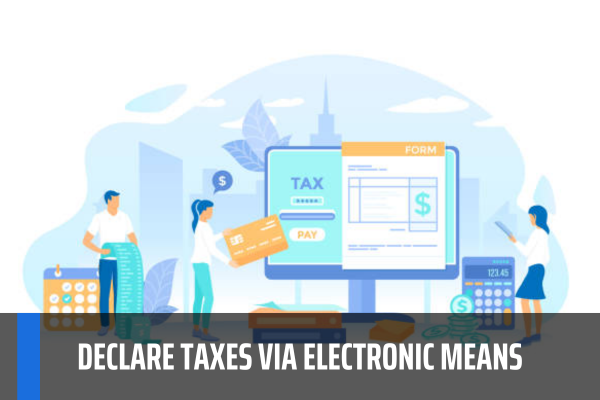How to declare taxes via electronic means according to the instructions in the latest Official Dispatch of the Hanoi Tax Department?
How to declare taxes via electronic means according to the instructions of the Hanoi Tax Department?
According to Official Dispatch 49223/CTHN-TTHT in 2023, the Hanoi Tax Department has opinions on tax declaration via electronic means as follows:
Carrying out business activities in areas with information technology infrastructure must declare, pay taxes, and transact with tax authorities through electronic means. When performing electronic tax transactions, you must use a valid digital certificate issued by an organization providing public digital signature authentication services, or a competent state agency which has the authority to recognize digital signatures on tax records and electronic tax documents.

How to declare taxes via electronic means according to the instructions of the Hanoi Tax Department? (Picture from internet)
What are the responsibilities of taxpayers in Vietnam?
Pursuant to the provisions of Article 17 of the Law on Tax Administration 2019, regulations on responsibilities of taxpayers are as follows:
Responsibilities of taxpayers
1. Apply for taxpayer registration and use TINs as prescribed by law.
2. Declare tax accurately, honestly and adequately and submitting tax dossiers on time; take legal responsibility for the accuracy, honesty and adequacy of tax dossiers.
3. Pay tax, late payment interest and/or penalties fully, on schedule and at the right location.
4. Conform to regulations on accounting, statistics and management, use of invoices and records as prescribed by law.
5. Truthfully and fully record the taxable activities and transactions.
6. Issue and deliver invoices and records to buyers with the correct quantity, type and actual payment amount when selling goods and/or providing services as prescribed by law.
7. Provide information and/or materials related to the determination of tax liabilities accurately, fully and promptly, including information on investment value; transaction IDs and contents of accounts opened at commercial banks and/or other credit institutions; explain declared tax and/or tax payment as requested by tax authorities.
8. Comply with decisions, notifications and requests of tax authorities, tax officials as prescribed by law.
9. Take responsibility for the fulfillment of tax liabilities as prescribed by law in case the taxpayer’s legal representative or authorized representative fails to follow tax procedures.
10. Taxpayers operating businesses in areas with available information technology infrastructure must declare and pay tax and carry out transactions with tax authorities electronically as prescribed by law.
11. Based on the availability of information technology equipment, the Government shall specify the documents that regulatory authorities already have and thus can be excluded from tax declarations, applications for tax refund and other tax dossiers.
12. Develop, manage and operate systems of technical infrastructure so as to ensure e-transactions with tax authorities; sharing information related to the fulfillment of tax liabilities with tax authorities
13. Taxpayers who have entered into related-party transactions have the responsibility to create, retain, declare and provide documents on taxpayers and their related parties, including information on related parties residing in foreign countries or territories according to the Government's regulations.
Thus, taxpayers have the responsibilities mentioned above.
What are the responsibilities of tax authorities organizing electronic information systems in Vietnam?
Pursuant to the provisions of Clause 7, Article 8 of the Law on Tax Administration 2019, the regulations are as follows:
E-transactions in taxation
...
7. Tax authorities organizing electronic information systems shall have the responsibility to:
a) Provide guidelines, assist taxpayers, providers of e-transaction services in taxation, banks and relevant organizations in carrying out e-transactions in taxation;
b) Develop, manage, operate the electronic tax information receipt and processing system, ensuring security, safety, confidentiality and continuation;
c) Develop information sharing systems, provide information on amount of tax paid to the state budget, on electronic tax payments by taxpayers to relevant agencies, organizations, individuals so as to process administrative procedures for taxpayers as prescribed by law;
d) Update, manage, provide information on registration of electronic tax transactions of taxpayers; verify e-transactions between taxpayers collecting organizations so as to implement administration of tax and of revenues of the state budget;
dd) Process administrative tax procedures electronically;
e) In case electronic records of taxpayers are already available in databases of tax authorities, tax authorities and tax officials shall use such data and must not request taxpayers to submit physical tax dossiers or tax payment records.
...
Thus, the tax authorities organizing electronic information systems shall have the above responsibilities.
LawNet
